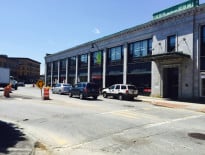Mayor Marty Walsh is on a mission to make Boston a less expensive place to live – and more power to him.
But whether Walsh ultimately succeeds in his bold bid hinges not on a few high-profile downtown projects like One Greenway, where millions of dollars in subsidies have helped finance a few hundred badly needed affordable apartments amid a forest of luxury towers. Walsh’s housing team clearly realizes the battle will be won or lost on how successful they are in getting developers to build thousands of new condominiums and apartments in the city’s working- and middle-class neighborhoods.
To that end, there’s now evidence that the momentum of housing development is not only starting to pick up in the neighborhoods, but even outpace the torrent of new and mostly construction downtown, notes Sheila Dillion, Boston’s housing chief and director of the Department of Neighborhood Development.
New housing permits in Boston’s neighborhoods have risen 132 percent since 2013, with 2,104 new apartments and condos given the green light last year alone, city stats show. Housing construction downtown, overwhelmingly dominated by luxury units, increased at a relatively slower 17 percent during the same period.
Better yet, the city is moving closer to meeting its ambitious annual goals for new apartment, condo and townhome construction, as the Walsh administration’s latest housing report card shows.
“We are putting some funding into more mixed-income development that have middle-income units, but what we really want to see happen is having the market respond and build a project that is more affordable,” Dillon said.
“You are not going to fund your way out of it,” she noted.
Potential Hotspots
The premise behind the Walsh administration’s neighborhood housing push is simple. Developers who build new projects in the city’s middle- and working-class neighborhoods will have to tailor their prices to meet the market, which means relatively lower prices than what new luxury addresses would fetch downtown.
Land costs, a major factor in driving up the cost of development, are also significantly lower in parts of Jamaica Plain, Roxbury and Dorchester than in the Back Bay, South End or even Fenway.
“We need to build in more moderately priced neighborhoods,” Dillon said.
The Boston Redevelopment Authority is already well along revamping zoning rules to pave the way for thousands of new housing units in a pair of up-and-coming areas, with two more just announced.
The scruffy Andrew-to-Broadway station corridor along Dorchester Avenue in South Boston is starting to attract developers in the wake of the city’s planning effort.
Ditto for the Jamaica Plain/Roxbury Washington Street corridor, between Forest Hills and Egleston Square, as well as Columbus Avenue between Egleston and Jackson Square.
In his state of the city address, Walsh rolled out two more “growth zones” – Dudley Square in Roxbury and Glover’s Corner in Dorchester.
Walsh and city officials have also pointed to Morrissey Boulevard/Columbia Point in Dorchester as rich in future housing potential, with plans for a major new apartment development at the South Bay shopping center now under review at City Hall.
A Carrot For Developers
Even as it hopes to get developers to embrace a wider array of price points as they build new neighborhood housing, the Walsh administration is also hoping to offer a major carrot.
City officials have filed legislation at the State House under which developers can write off any taxes due during the construction period and during the first two years as a new apartment building is renting up. Basically, the first five years are tax free.
The carrot would be offered to developers in exchange for building apartments and condos at more affordable price points.
“It would help with developers getting the right rate of return,” Dillon said.
Boston didn’t get into the luxury price bind it finds itself in overnight and it won’t get out of it overnight either. It may take years of new construction in the city’s neighborhoods to slow or stabilize rents and prices.
But after two years on the job, Walsh & Co. are off to a solid start.









